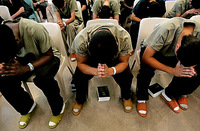Texas Youth Commission remains troubled agency
March 10, 2008
The Texas Youth Commission, the state's corrective system for juveniles, still continues to lurch and stumble in its recovery from the scandal that wracked it last summer. The system came under glaring scrutiny when it was discovered that youths under its care were being abused by staff and, worse, that the abuses had been ongoing for some time, covered up by bureaucratic inertia and callousness.
Written by , Corpus Christi Caller-Times

The TYC bureaucracy is supposed to be on the path to reform. But that road, as it turns out, may be a very long one unless much stronger action is taken. (photo courtesy regulus2.azstarnet.com)
The Texas Youth Commission, the state's corrective system for juveniles, still continues to lurch and stumble in its recovery from the scandal that wracked it last summer. The system came under glaring scrutiny when it was discovered that youths under its care were being abused by staff and, worse, that the abuses had been ongoing for some time, covered up by bureaucratic inertia and callousness.
The governing board of the Commission was summarily replaced, many of the higher-ups in the agency were ousted and the Legislature and Gov. Rick Perry agreed on strong oversight over the system. Since the middle of last year, the road has been rocky for the agency as it tries to do a turnaround.
The system has gone through three overseers, with the latest conservator appointed in December. But the latest disturbing reports heavily suggest an agency that operates under a loose regime that has still to shake off the mindset that got it in trouble in the first place.
Isolation punishment
Using inappropriate and even potentially psychologically damaging discipline on juveniles is not the kind of treatment that Texans are likely to expect from its juvenile justice system. Yet the Houston Chronicle reported that the TYC has made increasing use of isolation, putting incorrigible youths in solitary cells for extended periods of time.
The newspaper said that a report from the system's ombudsman said that some youths were being placed in isolation cells up to 23 hours a day. And these incidents are not isolated, but an increasing pattern, the ombudsman reported.
The concern is that while youths may be hard to handle, such tactics should be used only as a last resort and only after psychological evaluations and other individualized treatment and screening. And then the isolation is supposed to be used as part of the rehabilitation effort. But the ombudsman, Will Harrell, said that the isolation was used simply to punish the juveniles. Equally of concern is the lack of action on the report by Harrell; the report was made by Harrell in November but TYC authorities by this month had failed to respond.
Nor has this use of isolation been the only incident of backsliding. The agency has been sued over its reliance on the use of pepper spray as a control measure. The reports on the increasing use of isolation and the use of pepper spray paints a picture of a TYC regime that hasn't gotten the message. The state needs a system that rehabilitates juveniles under professional and accepted standards, that shakes loose from the system's history of a culture of abuse, mistreatment and coverup.
That the system has yet to free itself from its tainted legacy was underscored by a report from the Dallas Morning News that said the agency, instead of hiring badly needed guards, had spent hundreds of thousands of dollars for furniture, renovations and recarpeting of staff and executive offices.
The spending was in direct contradiction to legislators' rejection of requests for such spending. The agency said the money was left over because it didn't have enough applicants to fill the 500 correctional officer posts that remain vacant. The spending may be small relative to government budgets, but it speaks loudly about the misplaced priorities at the TYC.
Last year's scandal at the youth commission shocked Texans. The agency that was charged with rehabilitating the state's most troubled youths, referred there by courts all over the state, was found to be harboring sexual abusers within its own ranks. Worse, those abusers were enabled by a bureaucracy that knew about the abuses but simply didn't care, or refused to act.
The TYC bureaucracy is supposed to be on the path to reform. But that road, as it turns out, may be a very long one unless much stronger action is taken.
![]()
![]()
Related Stories
![]()
Fair Use Notice
This site contains copyrighted material the use of which has not always been specifically authorized by the copyright owner. We are making such material available in our efforts to advance understanding of environmental, political, human rights, economic, democracy, scientific, and social justice issues, etc. We believe this constitutes a "fair use" of any such copyrighted material as provided for in section 107 of the US Copyright Law. In accordance with Title 17 U.S.C. Section 107, the material on this site is distributed without profit to those who have expressed a prior interest in receiving the included information for research and educational purposes. For more information go to: http://www.law.cornell.edu/uscode/17/107.shtml. If you wish to use copyrighted material from this site for purposes of your own that go beyond "fair use", you must obtain permission from the copyright owner.